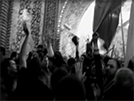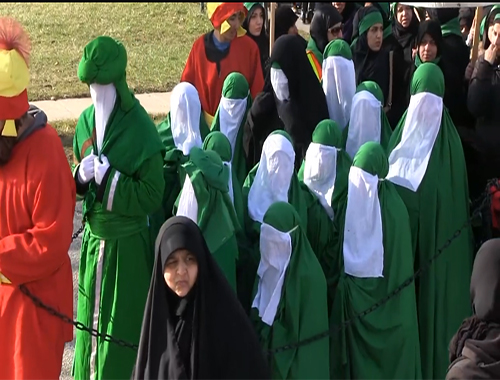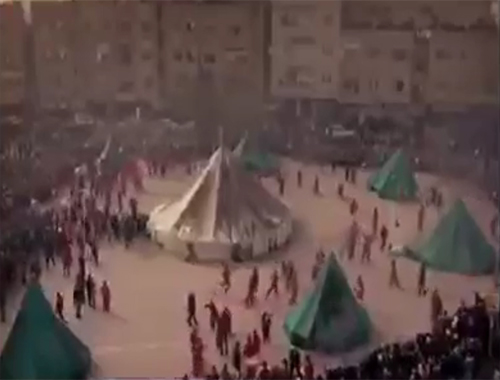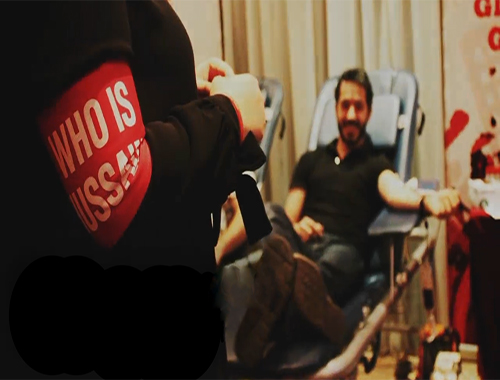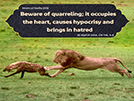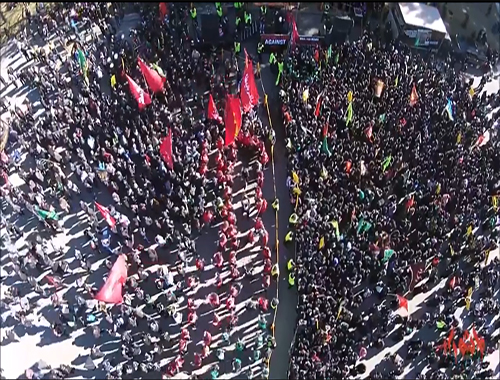The Life and Times of Imam Hasan(AS)
- Details
- Hits: 5446
He was born on the 15th of Ramadhan in the 3rd year of Hijra. One of his wives, named J'udah binte Ash'ath, poisoned him on Mu'awiyyah's instigation and bribery. He was martyred as a result of that on the 28th day of Safar in the 49th/50th year of Hijra. Some reports give the date of his martyrdom as the 7th of Safar. But that, actually, is the birth anniversary of the seventh Imam, Moosa al-Kazim, and the first date is more authentic.
He was named Hasan (the most beautiful - in looks as well as in character) by the Prophet of Islam on Allah's command. This name was never used for anyone before Islam.
Hasan was very dear to his grandfather, the Prophet of Islam. There are numerous hadeeth reports in praise of the two grandsons the Prophet had, Hasan and his younger brother Husayn.
The most famous of them all is as follows:
"Perhaps Allah will create harmony between two groups of Muslims who had been fighting, through this grandson of mine."
There are numerous stories about the two grandsons of the Prophet of Islam in the authentic books of hadeeth and history. Every collector of hadeeth has dedicated at least one whole chapter in their respective collections on this topic. We quote a few of them.
1. The Prophet said – al-Hasan and al-Husayn are the princes of the youth of Paradise, and their father is more glorious than the two of them.
2. These two grandsons of mine will be the Imams, whether they are standing (meaning: taking action against or for some ideology) or sitting down (meaning: accepting a situation without any action).
3. Bukhari reports from Abu Hurayra that the Prophet was holding Hasan and pressing him against his chest.
4. Bukhari reports that the Prophet was sitting on the pulpit and Imam Hasan was sitting next to him, he would look at the gathering and then he would look at his grandson and say: This grandson of mine is a leader, perhaps Allah will create accord between two groups because of him.
5. Bukhari reports from Usama bin Zayd: The Prophet was holding Hasan and Husayn and was saying: Allah Almighty! I love these two – You too love these two.
6. Bukhari reports from Barra bin Aazib: I saw Abu Bakr while he was holding up Hasan and was saying – I swear by the life of my father, you are closer in looks to the Prophet of Islam than your father (Imam Ali). (While Abu Bakr was saying this) Imam Ali was there and he just laughed.
7. Bukhari reports from Ibn Umar – The Prophet’s pleasure (for the Muslims) is in the love of his Ahlul-Bayt.
8. Bukhari reports from Anas bin Malik: No one was closer to the Prophet in looks than Hasan bin Ali.
Hasan had grown up with his grandfather, the Prophet of Islam. He was only eight years old when the Prophet of Islam passed away. Hasan came of age during the Khilafat of Umar bin Khattab. Once during a game Hasan got into an argument with a son of Umar, the Khalifa. When the argument was prolonged, Hasan said to the Khalifa’s son: You are only the son of our freed slave – you have no face to argue with us.
The Khalifa’s son was very angry. He came to his father and complained to him. Umar replied to his son – Can you go back to Hasan bin Ali and ask him to give that statement in writing? The son was very surprised and said: What would you do with that writing?
Umar said: I would say in my last will that that writing should be placed inside my shroud – that would be the guarantee for my salvation.
At the Battle of Camel while there was intense fighting – Imam Ali saw that misguided Muslims were coming before the camel on which Ayesha was riding and getting killed protecting it. He commanded that the camel should be felled. Imam Hasan went forward and with one stroke of his lance pierced both eyes of the camel. The camel fell and that ended the Battle of the Camel.
At the Battle of Siffeen when Imam Ali’s forces were confronting Mu’awiyyah’s forces, the latter took control of the banks of the river and denied water to the other party. Imam Ali commanded his sons, Hasan and Husayn, to go and fight. Hasan fought bravely and defeated the Syrian forces. However, on Imam Ali’s orders, everyone including the enemies were allowed to draw water.
Hasan was unanimously elected as Khaleefa of Muslims in the 40th year of Hijra after the assassination of Imam Ali. First the people of Koofa and Basra accepted him and then those of Madinah and Makkah approved. However, the governor of Syria, Mua'wiyyah, who had rebelled against Imam Ali previous to this, refused to accept Imam Hasan as the Khaleefa. It was unfortunate that Hasan was the first Khaleefa of Muslims to be ELECTED in peacetime, and Muslims could not uphold that due to their own selfishness and vested interests. Whether such people can be called Muslims is yet another question.
Hasan finally agreed to sign a treaty with Mua'wiyyah to avoid bloodshed. The conditions of the treaty, very briefly, were:
1. Mua'wiyyah will rule according to Qur'an and Sunnah.
2. He will stop harassing and torturing the people of Koofa (and those elsewhere) who were the followers of Ali.
3. He will stop the cursing of Imam Ali from the Pulpits.
4. He will not have the right to appoint a successor after him; the matter will be left to the Muslim community.
The rest will be related from Sh. Mufeed's Kitab al-Irshad, as follows:
Mua’wiyyah accepted all of this and made a treaty with Imam Hasan to observe it. He swore to him that he would fulfill it. When the truce had been concluded, Mu’awiyya went on until he reached al- Nukhayla. That was on Friday; he prayed the midmorning prayer (duha al-nahar) with the people and he addressed them.
In his address, he said: “By God, I have not fought against you to make you pray, nor to fast, nor to make the pilgrimage, nor to pay zakat. Indeed you do that (already). I fought so that I might have power over you and God has given that to me when you were reluctant to (obey) Him. Indeed I have been requested by al-Hasan, peace be upon him, (to give him) things and I have given things to him. All of them are now under my foot. And from now on I will not fulfill anything.”
Then he went on until he entered Koofa. He resided there for several days. When the pledge of allegiance by its inhabitants had to be carried out, he went up on the pulpit and addressed the people. He mentioned the Commander of the Faithful, peace be upon him, and that he had taken from him and from al-Hasan, peace be upon him, what he had taken.
Al-Hasan and al-Husayn, peace be on them, were present. Al-Husayn, peace be on him, rose to reply but al-Hasan, peace be on him, took him by the hand and made him sit down. Then he, himself, (al-Hasan) arose and spoke: “O you, who mention Ali, I am al-Hasan and Ali was my father. You are Muawiya and your father was Sakhr (Abu Sufyan). My mother was Fatima and your mother was Hind. My grandfather was the Apostle of God and your grandfather was Harb. My grandmother was Khadija and your grandmother was Futayla. May God curse him who tries to reduce our reputation and to diminish our nobility, who does evil against our antiquity and yet who has been ahead of us in unbelief and hypocrisy.”
Groups of people in the mosque shouted out: “Amen, Amen”
When the peace between al-Hasan, peace be on him, and Muawiya was concluded in the way we have mentioned, al-Hasan, peace be on him, left for Medina. He resided there, restraining his anger, staying close to his house, and awaiting the command of his Lord, the Mighty and High, until Mu’awiya had completed ten years of his administration. (Then) the latter decided to have the pledge of allegiance given to his son, Yazid, (as his successor).
He communicated secretly with J’uda, daughter of al-Ashath b.Qays[she was the wife of al-Hasan, peace be on him]to urge her to poison him. He gave an undertaking to her that he would marry her to his son, Yazid, and he sent her a thousand dirhams. J’uda gave him the poison to drink but he lingered on sick for forty days. He passed along his (final) road in the month of Safar in the year 50 A.H. (670).
At that time, he was forty-eight years of age. His succession (to the Imamate) had been for ten years. His brother and testamentary trustee (wasi), al-Husayn, peace be on him, undertook the washing and shrouding of his body, and buried him with his grandmother, Fatima, daughter of Asad b. Abd Manf, may God be pleased with her, in (the cemetery of) al-Baqi.
Various historians have recorded that when the news of Imam Hasan's passing away arrived in Damascus, Mua'wiyyah said Allah-u-Akbar very loudly and did a sajdah of thanks.
Imam Hasan had left a last will with his brother Husayn that he should be buried next to his grandmother, Fatima binte Asad. When the funeral procession was on its way to the Baq’ee cemetery where Fatima binte Asad is buried, Imam Husayn had it stopped at the Prophet’s burial place. A’isha, a surviving wife of the Prophet, had been following the procession.
She thought for a minute that they were going to bury Hasan next to the Prophet. She immediately intervened saying that she would not allow it. Suddenly the scene turned ugly. There were words exchanged between A’isha and Muhammad Hanafiyya, another son of Imam Ali.
A’isha turned to the Umayyad troops commanded by Marwan, who also had been following the funeral procession.
On her instigation, Marwan beckoned to his archers and they began shooting arrows at the procession. Numerous arrows were lodged in the coffin and actually seven of them had pierced the remains of Imam Hasan. The situation was brought back under control when Husayn explained that he was stopping there for blessings only and that he would bury his brother in Baq’ee next to their grandmother.
It is to commemorate that event that when Imam Hasan’s coffin is taken out by his devotees, even today, one sees a number of arrows lodged in it.
In his book titled `SIR-RUSH- SHAHADATAYN' or the secret of two sacrifices, by the well known Indian scholar Shah Abdul Azeez, also known as Muhaddith-e-Dehlavi has argued that the logical end of the story of Ibraheem and Isma'eel would be that Muhammad the Prophet of Islam would have sacrificed his life in Allah's way.
Martyrdom, the greatest glory for a Muslim was not achieved by the Prophet of Islam. Why? The Shah then answers that question as follows: A man can die only once and thus he can achieve martyrdom only one way. However, there are two types of martyrdoms: Shahadat-e-Sirri or secret or covert martyrdom, and, Shahdat-e-Jahri or overt or manifest martyrdom. If Allah had given one of those to the Prophet, he would naturally be deprived of the other.
To give his beloved Prophet the complete martyrdom, Allah gave him two grandsons, Hasan and Husayn. One was martyred by poisoning so he received the Shahdat-e-Sirri or covert martyrdom and the other received the Shahdat-e-Jahri by dying on the battlefield, or manifest martyrdom. In effect, Hasan’s as well as Husayn's martyrdom was Muhammad's martyrdom, which completes the religion Islam, which started with Ibraheem and Isma'eel.
By: Syed-Mohsin Naquvi

